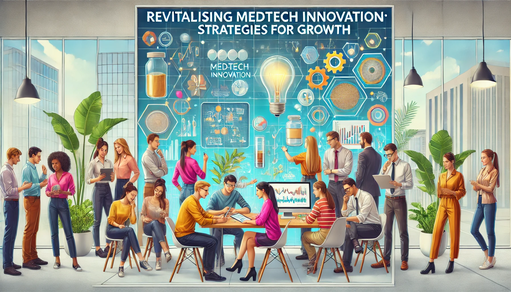- Continuous learning, adaptability, and innovation are essential for healthcare and MedTech companies to stay ahead in fast-evolving markets
- Strong leadership is key to cultivating a learning culture, challenging outdated norms, and driving lasting transformation
- Breaking down rigid hierarchies, silos, fear-based cultures, and short-term thinking is necessary to unlock innovation and growth
- Underperforming MedTech firms can become agile, knowledge-driven organisations through leadership renewal, cultural audits, and continuous learning
- Adopting a learning organisation model boosts competitiveness, improves patient outcomes, and strengthens long-term market resilience
How to Create a Learning Organisation?
In the rapidly shifting landscapes of healthcare and MedTech, where technological breakthroughs and patient needs evolve at lightning speed, adaptability, innovation, and continuous improvement have become non-negotiable. The traditional, hierarchical structures that once defined the industry have become liabilities, hindering agility, and slowing the pace of progress. In this environment, only those companies capable of learning, unlearning, and relearning can hope to stay ahead.
Enter the learning organisation - a dynamic force marked by its capacity to evolve through the constant acquisition, exchange, and real-world application of knowledge. These adaptive systems do not just react to change - they excel within it, transforming complexity into a catalyst for progress. By nurturing a culture that prizes curiosity, critical thinking, and collaboration across disciplines, such learning-driven environments establish themselves as resilient innovators, well-equipped to anticipate shifts in the landscape and respond with agility.
For traditional players in MedTech, enhancing growth, value, and long-term relevance depends on embracing a new way of operating. Yet, leaders shaped by decades in environments that prioritised stability over agility often face challenges in steering meaningful transformation. Longstanding technologies, entrenched product lines, and historically slower-moving markets have rewarded consistency rather than responsiveness. To remain at the forefront and play a role in healthcare’s ongoing transformation, these institutions must cultivate cultures where unfiltered feedback is welcomed, leadership evolves alongside innovation, and strategic focus shifts from tradition to adaptability. In a sector defined by continuous change, such evolution is not optional - it is essential.
In this Commentary
This Commentary examines the need for traditional healthcare and MedTech companies to evolve into dynamic learning organisations. In an industry shaped by rapid innovation, shifting patient needs, and complex regulations, adaptability and continuous learning are essential for success. By analysing leading models and common obstacles, we offer a strategic roadmap for developing agile, collaborative cultures. Challenging complacent leadership, the Commentary advocates for unfiltered feedback, cross-functional collaboration, and long-term vision - demonstrating how this shift sharpens competitiveness while advancing patient care and industry standards.
The Essence of a Learning Organisation
A learning organisation does more than encouraging professional development or occasional training sessions - it is a living, evolving ecosystem that systematically facilitates the growth of its people and, by extension, itself. At its core is the pursuit of knowledge, adaptability, and continuous transformation, enabling it to thrive in complex, ever-changing environments.
In his seminal work The Fifth Discipline, Peter Senge contends that effective learning organisations are built upon five interdependent disciplines: (i) personal mastery, (ii) mental models, (iii) a shared vision, (iv) team learning, and (v) systems thinking. These principles create a cohesive framework that empowers individuals and teams to question assumptions, align around common goals, and approach challenges holistically. Personal mastery supports self-improvement and a commitment to excellence; mental models encourage critical reflection of ingrained beliefs; a shared vision unites teams under a common purpose; team learning amplifies collective intelligence; and systems thinking integrates these elements, revealing patterns and interconnections that drive informed decision-making.
In a learning enterprise, knowledge flows freely across all levels, hierarchies flatten, and innovation becomes not just a goal but a natural by-product. This deep-rooted adaptability becomes part of the entity’s DNA, positioning it to anticipate change, respond with agility, and sustain long-term success in even the most volatile industries.
Why Learning Organisations Matter
The healthcare and MedTech sectors are rapidly evolving, driven by technological advancements, changing patient needs, and increasingly complex regulatory landscapes. In this environment, corporations that cling to outdated strategies risk becoming irrelevant. Learning-driven environments, grounded in adaptability, ongoing improvement, and innovation, are well-equipped to excel in times of disruption. This ever-evolving landscape brings into focus four areas where these agile systems consistently outperform more rigid counterparts:
- Rapid Technological Advancements The breakneck speed of innovation in healthcare and MedTech demands more than incremental updates to existing products. Yet, many traditional companies, despite their market standing and self-perceived industry leadership, often find themselves lagging. R&D budgets are too frequently directed towards marginal product tweaks rather than bold innovations, leaving these firms exposed to more agile competitors. Learning corporations, by contrast, excel at identifying, integrating, and scaling emerging technologies, ensuring sustained relevance and competitive strength.
- Patient-Centric Approaches The modern healthcare landscape is increasingly patient-driven. Systems that cultivate continuous learning are better positioned to understand evolving patient needs, leading to the development of more impactful, user-centric solutions that improve outcomes and satisfaction.
- Regulatory Complexity Healthcare operates within some of the most stringent regulatory frameworks. Learning organisations thrive here by fostering a culture of vigilance and adaptability, enabling them to stay ahead of policy changes and mitigate compliance risks effectively.
- Market Responsiveness Perhaps most critically, learning entities distinguish themselves through heightened sensitivity to market and technological shifts. Their leaders exhibit a strategic dexterity - capable of navigating immediate operational demands while remaining attuned to broader strategic trends that shape the competitive landscape. Unlike traditional players often tethered to legacy offerings in maturing markets, forward-thinking leaders within learning-driven environments anticipate change and position their teams to capture emerging opportunities. A case in point is the explosive growth of the sleep aid market, which many incumbents failed to recognise or act upon. In contrast, more adaptive firms leveraged their market awareness and strategic foresight to capture value in this rapidly expanding space - an advantage born from their ability to think long-term while executing effectively in the present. In 2024 the sleep aid market was valued at ~$87bn and is projected to grow to ~$163 by 2034; exhibiting a CAGR of 6.5%.
Effective leadership in learning organisations is defined not by control, but by the ability to create conditions where others can navigate complexity with confidence. Such leaders cultivate environments that reward curiosity, support experimentation, and normalise adaptation - laying the groundwork for collective intelligence to flourish in the face of change.
Leadership’s Role in Cultivating Learning Organisations
At the core of every thriving learning organisation are leaders who serve not just as decision-makers, but as intentional architects of culture - shaping environments where continuous learning and growth are embedded, not incidental. Nowhere is this more critical than in the rapidly evolving landscapes of healthcare and MedTech, where innovation, adaptability, and agility are non-negotiable. Here, leadership becomes the decisive force that either drives organisations forward or leaves them anchored to outdated paradigms.
Too often, seasoned executives - armed with past successes - struggle to transcend legacy thinking. In doing so, they risk cultivating cultures where tradition eclipses innovation, where feedback is dulled by hierarchy, and where maintaining the status quo is mistaken for stability. In contrast, forward-looking leaders embrace humility, curiosity, and the courage to challenge their own assumptions. This mindset translates into distinctive leadership behaviours that separate adaptive, future-ready approaches from those confined to incremental progress. Several key traits illustrate how such leaders stand apart:
- Visionary Leadership Effective leaders drive a shared vision that prioritises continuous learning and transformative innovation, inspiring teams to challenge conventional thinking rather than settle for incremental improvements.
- Robust Feedback Mechanisms Institutionalising structured, anonymous feedback loops ensures that diverse perspectives - from supporters, challengers, and disrupters - actively shape strategy, encouraging resilience and adaptability.
- Substance Over Ego Learning entities value merit over personality-driven influence. Leaders who elevate ideas above personal status create cultures of open discourse, where creativity and problem-solving thrive. Those who defend themselves as authorities, rather than relying on their position in authority, model the intellectual humility essential for organisations dedicated to learning and growth.
- Adaptive Mindsets The most effective leaders cultivate an understanding that expertise is collective and provisional. They see challenges not as threats but as catalysts for learning, actively inviting diverse perspectives and dissenters to test assumptions. By promoting curiosity and embracing continuous evolution, they create environments where growth is shared, and adaptive thinking becomes the norm.
The most effective leaders embrace humility, recognising that expertise is collective and that long-term success hinges on continuous evolution, curiosity, and the willingness to challenge assumptions. Leadership in learning entities Is not about control, but about enabling others to thrive in complexity, developing cultures where innovation and adaptability become the norm.
Successful Learning Organisations
The transformative impact of continuous learning is most clearly seen in those that embed adaptability and innovation into the fabric of their operations. These forward-moving players do not just respond to market shifts - they often define them, cultivating cultures rooted in growth, collaboration, and agility.
It is understandable that leaders from smaller-scale ventures might view examples set by global powerhouses like Medtronic, Johnson & Johnson, or Philips Healthcare as out of reach, given the disparity in resources and scale. Yet, the foundational practices behind their success are not the exclusive domain of large-scale actors. In fact, smaller teams often hold an advantage: streamlined decision-making, tighter collaboration, and a greater capacity to shift culture quickly and meaningfully.
The following examples highlight how both global leaders and more modest players can apply these principles to spark innovation and remain resilient in a constantly evolving landscape.
- Medtronic While Medtronic’s substantial R&D investments might seem out of reach for smaller firms, its commitment to fostering cross-functional collaboration is universally applicable. Smaller organisations can leverage their agility to create dynamic, multi-disciplinary teams that break down silos and accelerate innovation, often without the bureaucratic hurdles larger organisations face.
- Johnson & Johnson J&J’s decentralised management approach illustrates the power of autonomy and localised decision-making. Smaller entities can adopt similar principles by empowering teams to take ownership of projects, encouraging grassroots innovation, and creating flexible structures that promote responsiveness to market changes.
- Philips Healthcare Philips’s emphasis on real-time feedback from end-users demonstrates the value of external insights in driving product refinement. For smaller corporations, engaging directly with customers, clinicians, and stakeholders - often more accessible at a smaller scale - can yield invaluable data for continuous improvement and differentiation in the market.
- MongoDB MongoDB, a software corporation, exemplifies how cultural transformation transcends size. Central to its approach is a disciplined, systematised practice of gathering regular, anonymous, and objective feedback focused on assessing its managers, executives, and leaders. This is not a symbolic exercise, but a deliberate mechanism designed to drive accountability, surface blind spots, and fuel continuous leadership improvement. By embedding this practice into the its operations, MongoDB ensures that leadership behaviours are scrutinised, measured, and refined - not left to executives’ subjective opinions or self-assessments. This model is neither exclusive to tech giants nor dependent on scale. In fact, smaller organisations may find such initiatives easier to implement, enabling faster cultural shifts and stronger, more engaged teams. MongoDB’s assessment strategies serve as a blueprint for any company seeking to hold its leaders accountable - and to create a culture where growth, transparency, and responsiveness is the norm.
|




 1 comment
1 comment



















